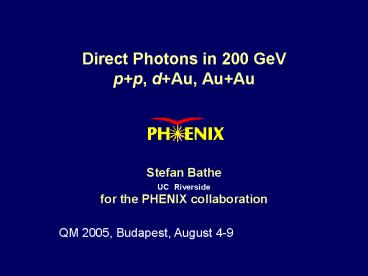Direct Photons in 200 GeV p p, d Au, Au Au
1 / 41
Title:
Direct Photons in 200 GeV p p, d Au, Au Au
Description:
Stefan Bathe UC Riverside for the PHENIX collaboration. QM 2005, Budapest, August 4-9 ... Stefan Bathe. 16. Calculate ratios of various Minv bins to lowest one: Rdata ... –
Number of Views:30
Avg rating:3.0/5.0
Title: Direct Photons in 200 GeV p p, d Au, Au Au
1
Direct Photons in 200 GeV pp, dAu, AuAu
- Stefan Bathe
UC Riverside
for the PHENIX collaboration
QM 2005, Budapest, August 4-9
2
Why Direct Photons?
- AA
- Photons dont strongly interact with produced
medium - Hard photons
- Allow test of Ncoll scaling for hard processes
- Important for interpretation of high-pT hadron
suppression at RHIC - Thermal photons
- Carry information about early stage of collision
- QGP potentially detectable via thermal photon
radiation
- pp
- Test of QCD
- Reduce uncertainty on pQCD photons in AA
- dAu
- Study nuclear effects
3
Hard Photons
- pp
4
Direct Photons in pp
- good agreement with NLO pQCD
- Important baseline for AuAu
5
Hard Photons
- dAu
6
Direct g in dAu
- pp and dAu spectra compared to NLO pQCD
- ratio to NLO pQCD
- consistent with 1
- No indication for nuclear effects
2
Poster H. Torii
Poster D. Peressounko
7
Hard Photons
- AuAu
8
Direct Photons in AuAu
Recently published
PRL 94, 232301
Expectation for Ncoll scaling of direct photons
holds for all centrality classes
- p0 suppression caused by medium created in AuAu
collisions
9
Thermal Photons
- AuAu
10
Schematic Photon Spectrum in AuAu
11
Going to low pT
- No significant excess at low pT
12
New from Run4
- New data set
- Selection of most stable runs
- Re-evaluation of systematic uncertainties
- Stay tuned for more improvements
13
Thermal Photons
- AuAu
A New Approach
14
Opening up the phase space
pT
Minv
0
15
The Idea
- Start from Dalitz decay
- Calculate invariant mass distribution of Dalitz
pairs
invariant mass of virtual photon
invariant mass of Dalitz pair
invariant mass of Dalitz pair
invariant mass of virtual photon
phase space factor
form factor
phase space factor
form factor
- Now direct photons
- Any source of real g produces virtual g with
very low mass - Rate and mass distribution given by same formula
- No phase space factor for meeltlt pT photon
16
Method
- Material conversion pairs removed by analysis cut
- Combinatorics removed by mixed events
0-30
90-140
200-300
140-200 MeV
Rdata
- Calculate ratios of various Minv bins to lowest
one Rdata - If no direct photons ratios correspond to Dalitz
decays - If excess direct photons
17
(No Transcript)
18
(No Transcript)
19
S/B1
p0
20
S/B1
calculated from Dalitz formula
p0
measured
21
S/B1
calculated from Dalitz formula
p0
measured
22
S/B1
calculated from Dalitz formula
p0
measured
23
Rdata
140-200 MeV 0-20
24
gdirect/ginclusive
0-20
Significant 10 excess of
very-low-mass virtual direct photons
25
Centrality Dependence
Indication for centrality dependence
26
Comparison to Conventional result
27
gdirect
28
The Spectrum
Compare to published Run2 result PRL94 232301
29
The Spectrum
30
The Spectrum
Compare to thermal model
- D. dEnterria, D. Perresounko
- nucl-th/0503054
21 hydro T0ave360 MeV(T0max570 MeV) t00.15
fm/c
- data above thermal at high pT
31
The Spectrum
Compare to thermal model
- D. dEnterria, D. Perresounko
- nucl-th/0503054
21 hydro T0ave360 MeV(T0max570 MeV) t00.15
fm/c
- data above thermal at high pT
Compare to thermal pQCD
- data consistent with thermal pQCD
32
Conclusions
- Hard direct photons pTgt4GeV/c
- pp
- Spectrum consistent with pQCD calculations
- dAu
- No apparent nuclear effects
- AuAu
- Confirms Ncoll scaling for hard processes
- Thermal (?) direct photons 1ltpTlt4GeV/c
- New EMCal measurement with reduced systematics
- Stay tuned for further improvements
- New measurement through very-low-mass virtual
photons - Significant 10 direct photon excess above decay
photons - Spectrum consistent with thermal model
33
(No Transcript)
34
Backup
35
(No Transcript)
36
WA98 Interpretation T or kT ?
- QGP HG rates convoluted with simple fireball
model plus pQCD hard photons - Data described with initial temperature Ti205
MeV some nuclear kT broadening (Cronin-effect) - Data also described without kT broadening but
with high initial temperature (Ti270 MeV)
Turbide, Rapp, Gale, Phys. Rev. C 69 (014902),
2004
37
WA98 Data Conclusions
Data can be described under a variety of
different assumptions, e.g.
- Data consistent with QGP picture, but also with
pure HG picture - Large variations in extracted initial temperature
Ti (however, most models give Ti gt Tc)
38
PHENIX p0 RdA--Final
Cronin effect small!
New for QM to be published
39
(No Transcript)
40
90-140
90-140 MeV, 20-40
41
Only Ncoll scaling?
- What about fragmentation photons?
- fragmentation contribution substantial in pp
- parton energy loss in QGP reduces fragmentation
contribution in AuAu - compensated by induced photon bremsstrahlung in
QGP
fragmentation contribution ()
- Effects cancel?































